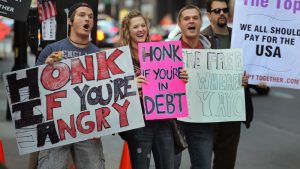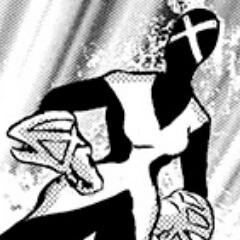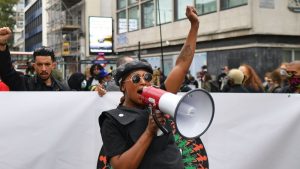
Posted on February 7, 2012
Carrying my bike up the stairs from the BART station straight into Oscar Grant Plaza (formerly Frank Ogawa), the very first scene I came upon was a highly charged, two or three-hundred person General Assembly. Not having seen with my own eyes the mass marches complete with bottle-throwing, window-smashing, and frustrated pacifists (always a funny sight), I was (to say the least) stunned. There were pockets of people lumped together in side debates while many individuals were aching to get on the human mic and shout out their condemnation of any “acts of violence” with others advocated respect for “diversity of tactics.” People gave impassioned and moving speeches as if convincing the crowd was a life or death matter. Though I lacked experience as an occupier and an activist, philosophy and critical theory prepared me for this great argument which played a crucial role in forming occupy Oakland: the question of violence. The work of certain philosophers, most notably Simon Critchley, can help elucidate the problem of non-violent resistance along with making finite vs. infinite demands. I’ve come to accept ‘diversity of tactics’ as an important principle for avoiding the co-option and disintegration of Occupy Oakland. I believe it is primarily diversity of tactics and pin-pointing the police as an enemy, along with eschewing demands and leaders common to other occupies, that has kept Occupy Oakland resilient and adaptive.
Critchley often characterizes himself as an anarchist or “neo-anarchist” philosopher and works extensively on the body of thought relating to utopia, critical resistance, and ethical demands. As a weak, marginalized force living under the rule of economy-controlling elites, making demands towards players within the political system or opting for more justice than such a system can provide is a complex issue. Demanding too little or too much could derail any chance at effectively altering an intolerable situation. Making infinite demands – transcending local conditions – has the ability to change the very terrain of the situation, as long as the local aspects are not forgotten entirely. Similarly, condemning violence, on the surface a worthy proposition, could limit the groups actions considering its a universally binding principle in a local context. My interpretation of Critchley’s thought will center around connecting both recent and timeless philosophical debates with the urgent and very much ongoing occupy protests, with a local focus on Occupy Oakland. My fascination and attachment to Occupy Oakland stems largely from our commitment to rejecting all potential threats of co-option – a recurring theme in critical theory and philosophy.
Facing a swelling of large corporate manipulation of public government and the inability of one to check the other, the call for a radical politics that is not immediately accommodated by the powers that be has taken on a radical ethical dimension moving people to protest indefinitely. The forces of the state and the financial institutions have grown so large and wedded to each other that enforcing accountability (moral hazard) leads to the potential for total structural collapse – ‘too big to fail’. If we are to imagine a future not tainted by apocalyptic visions, a wholly different kind of politics is required which avoids the perils of “state or market” language. The political options which seem viable and realistic for fighting dominant powers (e.g. reforms, electing new candidates, etc.) are circumvented into existing political bodies held hostage by large corporations. These bodies, ever-hungry for more profits, have accumulated so much money and have such a giant (visible) hand in the relations between people, that governmental bodies cannot prosecute their fraudulent, environment-ruining, parasitic (you get the idea) behavior. Doing so would bring a dramatic restructuring of economy and society which many desire but would challenge the means by which the 1% maintain their power. And so we have reached a bind where a struggle is inevitable and revolutionary ideas find new contexts in which to be articulated.
A resurgence in utopian thinking has emerged that need not be limited to a theoretical analysis of blank slate, state of nature societies, which tend to go straight to the top and restructure the corrupt world of the present according to a theory. The experience of the 20th century fresh in our memory, utopian thinking has a such stigma attached to it that we forget that we are living in a utopia in the present: Capitalism. “The various anti-capitalist experiments in communal living and collective existence…”, as Critchley points out in his Faith of the Faithless lecture, “seem to us either quaintly passé [or] laughably unrealistic”. Often public rage fueled by fantastical dreams of other worlds are swept away as childish and infantile, distracting from real-world politics, as Jean Quan has repeatedly remarked of Occupy Oakland. Yet this supposedly real political world has already been taken over by a revolutionary band of elite speculators, lobbyists, and bankers who’s sole motivation is increasing profits – disallowing governments to provide services for it’s people (if such is its true goal). We live in an era that is just another utopian vision – an ideology of the free market that “works” so well it is increasingly more difficult to imagine anything other than apocalypse as Slavoj Zizek has said. The full frontal assault on de-regulation of markets by neo-liberal ideologies (made painfully clear in the Powell Memo) has been successful, and their beliefs of individualism, free-markets, and limited government are widespread in our lexicon. These ideas and institutions backing them brought the entire economy to the brink of collapse in 2008, and business as usual continues along with increased protection from the fawning governments who in turn must step up to match it’s growth.
Without a utopian style of thought, the utopia (or dystopia if you like) that has won out in the here and now and covered itself over as most “natural” will continue to extend its reach and risk bringing down more of the world in its next inevitable crisis. These forces are at work here in Oakland under the guise of the chamber of commerce which has made false claims that the Oakland commune has hurt small businesses in the surrounding area, when it is quite clear that they target the radical political message. Anti-capitalist utopian political movements will obviously frighten the institutions held accountable for generating business and protecting their interest, and their press releases will discourage any talk of other worlds when they prosper from this one. Such is my localized reading of Critchley’s statement: “abandoning the utopian impulse in our thinking and acting is to imprison ourselves in the world as it is and give up the prospect that another world is possible.” (TFotF). The ‘other world’ spoken of by philosophers and believers, and occupiers shouting in the streets, does not culminate in a unified vision for the future; though utopian for attacking the dominant class controlling this world, no program has been elaborated by “the” movement.
A radical utopian politics no longer necessitates a grand coup, for local experimental communes (like the Oakland Commune) are springing up from the ground level rather than negotiating with existing authorities. While distancing itself from the city, state, and federal governments, holding its own decision making body as an alternative model (the General Assembly), occupiers exert constant pressure on them by rallying and marching in the street staging shut-downs of corrupt businesses. Acknowledging that we have a stake in the future of this civilization yet it’s avenues for reforming it are ineffective, a separation – a new tactic and a new community – occurs that operates fundamentally different from and directly challenges that civilization. When Critchley writes “for me, politics is all about the movement between no power and state power and it takes place through the creation of what I call ‘interstitial distance’ within the state”, (VToSZ) I see the same kind of politics arising from the occupy movement. Remaining within the state and even the city, these protests break away from politics-as-usual in style and substance (collective decisions and community forging) refusing to play by the state’s rules but refusing to leave it either. This sets up a site of confrontation between the powerful representatives of the people (who coordinate with predators) and the people themselves (the prey). The confrontation will yield battles (in the street, the press), the outcome of which remains to be seen. The force of these communes are weak compared to the multiple weapons of the state, but all genuinely new ideas and bodies of political significance start small, gaining momentum through the righteous energy of the ethical call.
A revolutionary politics is necessary in this context but the source of this energy is purely negative or critical: the rule is intolerable and something must change. With no specific theory of society moving it forward, the community can remain critical of the greater society already inhabited without pushing for a total restructuring of it. The new communal zones sprouted from this critical-revolutionary energy replace the desire for a fundamental, top-down rearticulation of societal relations. The task of managing a radically inclusive common living space is difficult enough: the consequence of protesting indefinitely and showing the failing governments what taking care of each other looks like. I read this new style of politics in Critchley when he says:”[f]or me, the activity of politics is working within the state against the state in an articulation, an inventive movement, (my emphasis) the forging of a common front that opens a space of resistance and opposition to government and the possibility of significant political change.” (VToSJ) The common space has been opened and seeks something new without an immediate object at hand, a party, or an ideology to champion above what exists. Occupying puts bodies into space together with the common understanding that something is terribly wrong, leading to inspiring conversation and serious organization obstacles; but all of this is done with the feeling that this world has to change, or just go away, and that another world must be worked on as well as dreamed of.
These communes from within the State engage oppressive forces via their respective cities, who are equipped with riot cops and opinion swaying media. Concerning the charge that Occupy Oakland has not endorsed non-violence as a rule and so alienates the 99%, the ‘diversity of tactics’ principle leaves open physical resistance so as not to be crushed by a overwhelming police force. Simon Critchley writes almost identically: “we cannot expect a radical change in the state of human beings in the world if we exclude violence as a matter of principle.” (VToSZ) Adopting the principle would demand a negative commitment, a prohibition on actions in a bureaucratic, totalizing manner. Even if a majority of the 99% desired such a commitment to peaceful protest, doing so would marginalized and drive out the radical and confrontational element in these protests, without which the police would simply suppress. Such a “radical change” is what the Oakland Commune allows to be in the discussion, making it even more inclusive than other occupy movement’s who adhere to non-violence – despite Oakland’s hostility towards officers in the camps.
While the non-violent tactics of heroes like Martin Luther King Jr. and Mohandas Ghandi made significant progress in civil rights struggles, the danger of absorbing them is described simply by Critchley. The general principle at work cannot be extracted from its particular circumstance to represent all others; different locations may require different principles.
“There are contexts, multiple contexts, to painfully many to recall, where non-violent resistance is simply crushed by the forces of the state, the police, and the military. In such contexts the border separating non-violent warfare to violent action has to be crossed, politics is always a question of local conditions, of local struggle and local victories. To judge the multiplicity of such struggles on the basis of an abstract conception of non-violence is to risk dogmatic blindness.” (TFotF)
The possibility remains that King’s tactics might not fit this situation. It remains questionable whether racist laws and law enforcement has been defeated by non-violent movements in the sixties, or whether they were merely local victories in a greater war. Angela Davis has argued forcefully against this notion in Are Prisons Obsolete? reminding readers of the disproportionate incarceration of black Americans among other current racial injustices. The counter to non-violence need not be forced into an either-or logic turning violence into a goal and anarchists into villains. Quoting Critchley: “Of course, non-violence is the aim of anarchist politics, but why should anarchists be the only political agents who have to decide beforehand that they will not be violent, when the specific circumstances of a political situation are still unknown?” (VToSJ) The Oakland commune has collectively decided that local conditions in Oakland demand a violent edge to its tactics of resistance for this radical experiment to survive, or simply refused to exclude its possibility in the General Assembly. Taking a look at those local conditions reveals a complex struggle in Oakland not confined to the present occupy phenomenon, spanning a startling history in it’s Police Department which will now include federal receivership.
The biggest dilemma facing supporters of the occupy protests is whether maintaining these sites of conflict only alienate the supporters on the fence and stifle momentum or whether it forces police repression into the spotlight. Upon viewing the massive arrests and street battles of January 28th, with illegal police misconduct in plane sight, the response from mainstream media attentive observers is often to accept the ‘violence vs. peace’ narrative about the movement. With a police state rapidly approaching (consider the 2012 NDAA’s language in art. 1021, SOPA, PIPA, ACTA, the NYPD’s surveillance technology, and coordinated city crackdowns on occupations nationwide), the corporate media focuses on property damage (constitutionally protected burning of American flags, graffiti, window-breaking) and the shield bearing, retaliatory front-line marchers with both peace and anarchy symbols painted on them (though far more peace signs) as evidence of provocation. The largest bay area news outlets (namely the SF Chronicle and Oakland Tribune) go so far as to report on police “injuries” in the first paragraphs, such as bruises and finger cuts, when they openly shoot projectiles at protester’s heads and gang tackle and beat straying protesters on camera. This is commonly referred to as the divide and conquer tactic familiar now to occupy circles: create in-fighting by controlling the narrative and getting a fearful public to switch sides or at least waver. Many are convinced that the focus of the movement should be on public relations and gaining more support from the 99% – convincing outsiders, while others don’t shy from antagonism: confrontations with the police must go on.
The central problem of turning the occupy movement into a PR war and denouncing violence is that the police can always enforce the interests of the 1% with violence of their own. Forcing one player into a decision that the other can forego creates an overwhelming advantage. Increasing the number of people in a peaceful protests to unpoliceable levels is effective in many cases, like general strikes and shuting down businesses, but the national guard can always be called – what could a huge crowd do peacefully against a militarized force willing to follow any order? Putting a benign face on the movement to make as many people as possible feel good about it a strategy that will yield the change we need in the long run? These question wouldn’t matter if the focus was on the horrifying actions of riot police I’ve seen personally and risked receiving (their actions would sell themselves) instead of the tactics of protesters. The corporate media will chip away at public opinion in any case, so improving the image of occupiers will always be a battle. The skirmishes on Oakland’s streets has spilled over into the media, and the large news providers pose a huge threat in shifting the attention away from increasingly more brutal police tactics. Mike King’s piece about the counter-insurgency against Occupy Oakland and Jaime Omar Yassin’s blog post on police violence highlight these concerns very well.
By foregoing a non-violent resolution and committing to a necessary utopian politics without an endgame, a confrontation with repressive authorities (whom native Oaklanders know all too well and whose misconduct has been well documented ) won’t be crippling, for they are allowed to fight back. An enemy has been spotted carrying out the orders of the 1%, and Oakland has seen the puppet strings over their heads – as well as the tear-gas, flash-bangs, and batons. The focus on violence cannot be tossed away by sanctioning peaceful tactics at this point, it must instead be redirected at police brutality made transparent by our citizen-journalist. Occupy Oakland’s media team has done a tremendous job at countering the biased journalism coming from the mainstream and reaching a broader audience with personal testimonies, live-streamed videos, and a variety of indy-reporting.
Nothing one does will make the ‘violence’ narrative go away – the powers losing their legitimacy will use their trump card to promote fear whenever the issue comes up. My gamble is that the tactics which will have the best effect will be the ones that reverse the blame on the police and check the lies they spread with hard evidence. But without a site of confrontation, the momentum feeding off of popular outrage will dwindle, and the effectiveness of this new style of revolutionary politics would slowly ebb away into piecemeal reforms. One way or another, to bring about the change we so desperately need right now, their will be conflict. We cannot win by taking the bait of the non-violence principle and so divide into two camps when a diversity of tactics means so much more than one tactic or it’s opposite.
Whether Simon Critchley agrees with my analysis and opinion or not, his thought has influenced mine a great deal (along with other philosophers in the tradition of critical resistance) and helped move me to participate in Occupy Oakland actions. The critical community that has arisen in Oakland resembles much of the theoretical debates that have persisted throughout history, and many of the same ideas discussed at meetings there resonate with timeless philosophical epochs.
Simon Critchley, “The Faith of the Faithless“. May 2011 (TFotF)
Simon Critchley, “Violent Thoughts on Slavoj Zizek“. (VToSJ)








